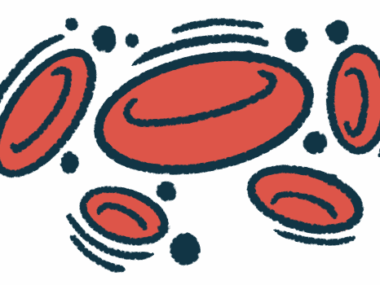Blood test markers may help predict response to PNH C5 treatments
Findings from real-world study may aid doctors in tailoring C5 inhibitor therapy
Written by |

Levels of certain immune proteins in the blood may help predict how well people with paroxysmal nocturnal hemoglobinuria (PNH) respond to the therapies Soliris (eculizumab) and PiaSky (crovalimab-akkz), a new study reports.
“These findings indicate that higher baseline levels of these markers may help identify patients at greater risk of suboptimal response to [Soliris and PiaSky],” the researchers wrote. The team said people with high levels of these markers may warrant closer monitoring and/or consideration of alternative treatment approaches.
The study, “A single-centre, real-world study on the efficacy and recovery of inflammatory cytokine levels of C5 complement inhibitor therapy in patients with paroxysmal nocturnal haemoglobinuria,” was published in the British Journal of Haematology.
In PNH, a part of the immune system called the complement cascade becomes abnormally activated, driving hemolysis (the destruction of red blood cells). Soliris and PiaSky, both approved PNH treatments, work to block complement activation by targeting a protein called C5.
Complement-blocking therapies effective for many, but not all, with PNH
Complement-blocking treatments, such as Soliris and PiaSky, help control PNH in many people. Still, some patients respond better than others, and predicting who will benefit most remains difficult. In this study, scientists in China looked for biomarkers that could be measured to help predict response to Soliris and PiaSky, the only two C5-targeting therapies approved for PNH in China.
The study analyzed data from 57 people with PNH who received either Soliris or PiaSky at the researchers’ center. Safety data were overall in line with the known profiles of Soliris and PiaSky. The most common safety issues were infections — a well-established risk with these immune-suppressing medicines — but none were severe.
In more than three-quarters (78.9%) of the patients, the treatments effectively achieved hemolysis control, with markers of red blood cell death decreasing to near-normal levels. In more than two-thirds (68.3%) of the people, blood transfusions were no longer needed during complement-targeting treatment.
These data “confirm the favourable efficacy and safety of C5 complement inhibitors in Chinese patients with PNH,” the researchers wrote, adding that these results are overall consistent with prior studies on these therapies.
When the researchers analyzed blood samples taken before treatment, they found that people who did not achieve hemolysis control had significantly higher levels of the C5 protein compared to those who responded well. Non-responders also had significantly higher levels of a few other immune-related proteins — including C5a, C3, C1q, granulocyte colony-stimulating factor (G-CSF), and tumour necrosis factor-alpha (TNF-alpha).
“Elevated baseline levels of C5, C5a, C3, C1q, G-CSF and TNF-[alpha] were associated with suboptimal therapeutic responses, highlighting their potential as biomarkers for risk stratification and early identification of patients who may require intensified monitoring or adjunctive interventions,” the researchers concluded.
Soliris is sold by AstraZeneca and PiaSky by Roche; neither company was involved in this study.






